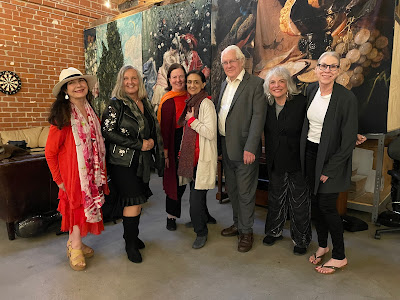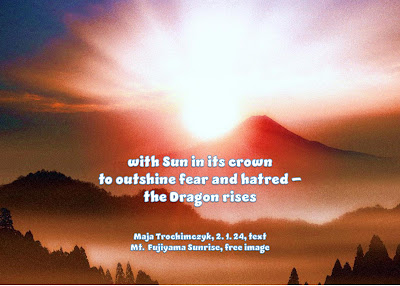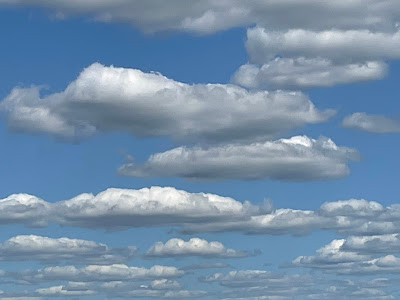Sometimes it is good to change the topic, from work and urgent personal interests to something else. Last Sunday (February 11) this "something else" was the celebration of 205th Birthday of artist, writer and visionary John Ruskin, organized by the John Ruskin Art Club, the oldest cultural organization in Los Angeles, established in 1888. Chaired by poet, writer, journalist and composer, the Ruskin Club's Executive Director, Gabriel Meyer, the event had a rich and varied program.
https://ruskinartclub.org/history
https://ruskinartclub.org/board-of-directors
First, in tribute to the great Ruskin, wonderful poet and the Club's Board member, Elena Karina Byrne read three poems she selected for this occasion, including one by Denise Levertov celebrating the life of John Ruskin and one of her own, about the art of seeing the world, carefully observing every detail on the wings of beetles.
The Executive Director Gabriel Meyer introduced the program that started from a fragment of a 2019 film by Robert Hewison using a quote from Ruskin as its title: "All Great Art Is Praise." This documentary presented fragments of a bi-centennial event held at the Royal Academy of Art in London, with actor Michael Palin reading excerpts from Ruskin's unfinished autobiography, Praeterita, illustrated with slides of Ruskin's paintings of Venice. Two notable quotes resonated with the audience for the rest of the afternoon: "All great art is praise" and "There is no wealth, but life..."
After hearing another quote, I decided to write a poem in tribute to Ruskin, inspired by this quote: "To see clearly is poetry, prophecy and religion all in one."
Everything is Perfect
Ivan Antic says. We are here to explore
everything. To praise, create, enjoy. Share the joy.
See and describe the sublime.
As John Ruskin taught us. As he saw.
The ancient castle at sunrise. The snow-capped
mountain tops. The intricate patterns
of butterfly wings. The aspen tree.
Clouds over Venice rooftops above misty canals.
Sea foam and storms of Turner's paintings.
The red-headed angels of pre-Raphaelites.
Fire and infinity of Tintoretto.
He looked, and saw, and recorded
the ever shifting, evolving, waxing
and waning beauty of the world.
This world. Our world. Given to us
to see - build - create - discover.
The bliss of color. The bliss of shape.
The bliss of art. The bliss of life.
Thank you, John Ruskin.
The highlights of the birthday bash included the world-premiere of Two Berceuses for cello and piano by Gabriel Meyer and Six Folk Songs by Ralph Vaughan Williams (1872-1958), featuring cellist Allan Hon and pianist Alex Zhu, professor at Occidental College and Pierce College. What a joy to hear the honey-rich tones of the cello filling the space, with the subdued accompaniment of the Ruskin Club piano, that found in the Telescope Studio its permanent home.
I liked the sweet Berceuses a lot, but will not be a music critic this time describing their charms. The settings of English folk songs by Williams were brief and highlighted the "found" melodies instead of the skill of the composer. They made me think of the role of late-romantic beautiful music in English music history and its neglect in Poland. We too have had many composers who wrote beautiful settings of folk songs, starting from Ignacy Jan Paderewski, yet their work has not been properly appreciated by their compatriots, deluded by the myth of progressivism - and reserving praise for works of "avant-garde" instead of works of beauty. The musicians Mr. Hon and Zhu gave justice to the music in a lively and uplifting performance, and perfect musical collaboration, giving primacy to the composers, not to interpreters. There is plenty of skill in that!
The annual toast to Ruskin, with a glass of sherry was given by a gallery-owner, and a walking encyclopedia of art, Ruskin Art Club Board member, Stuart Denenberg, co-owner of Denenberg Fine Arts with his wife, Beverly. Indeed, we should praise art that is "praise of this world" - and celebrates beauty, instead of chaos, disruption, violence, hate. . . I must say I was a bit distracted during his toast (sorry!) as I met Eric Jessen, former Chief of Orange County parks, etc. department, who was instrumental in greatly expanding the OC parks system, purchasing, for instance, for the county the Helena Modjeska Historic House and Gardens, now one of only two National Historic Landmarks located in O.C. He previously spoke about the Modjeska House during my lecture on the great actress at Laguna Art Museum in 2019. A long-time Board member of the Ruskin Art Club, he serves as its Secretary. What a welcome reunion!
During the champagne and sushi reception after the speeches and concert, I was happy to reconnect with Polish American community - Elizabeth Kanski, former President of Polish American Film Society and the Modjeska Club, and Mirek Towski, a great photographer, how was invited by Stuart Denenberg. I invited two poets, Ambika Talwar and Susan Rogers, and we were happy to visit other Los Angeles poets from our circle: Elena Karina Byrne, Elena Secota, and Gabriel Meyer - all of whom I had invited as featured poets to the readings of Village Poets at the Bolton Hall Museum in Tujunga when I still served as the readings Program Chair.
Happy birthday, John Ruskin!
We live on a planet where it rains diamonds —
hard rain, sparkling crystal droplets — in the clouds,
in the air, on the ground under our feet.
Here, the Valentine’s Day falls on Ash Wednesday.
Red strawberries, wine-hot passion and Ashes to ashes,
dust to dust — lessons of impermanence of the body,
constantly reconfigured in a vortex of quarks and atoms
until the pattern dissolves like snow at the end of winter.
Delicate snowdrops peek from under the melting cover
of phantasmagorical shapes and figures.
Here, the Annunciation Day of Mary’s greatest joy
falls on Palm Sunday — from rainbow wings of Fra Angelico’s
Gabriel bowing before the shy, blushing maiden in royal blue
we look ahead to the green of palm fronds lining the streets
of Jerusalem. We welcome the destiny of the King.
We see red blood on the stones of Golgotha,
the Place of the Skull. Not even this is real.
No wonder, then, that Easter, the greatest Mystery —
of Death into Life, Spirit over Matter, the Divine
in an emptied human shell — Eli, Eli, Lema Sabachthani —
Sanctus, Benedictus, Agnus Dei — it is done —
yes, that Easter — is on April’s Fools Day this year.
We fool ourselves when we see death as enemy.
We spin our lives into thin filaments of a spider-web.
Illusion woven into illusion. Deception after deception.
They rise and fall with the rhythm of seductive charm.
The smiling demon is the most persistent. Incorrigible,
it pulls us down, down, down into the mud,
from whence we did not come. Nothingness
ties us up with bonds of non-belonging.
My revelation is this — we live on the planet
where it rains diamonds. We walk on untold treasures
that we do not notice — we forget and forget and forget
where we came from, where we are, where we are going.
We spin our future out of spider silk and shadows.
Our lives fill with the sand of dreams, changing
like shards of glass, broken bits of colored plastic
in a kaleidoscope — transfigured into the most
astounding waltz of the rosettes, reflected
in hexagonal mirrors of transcendence —
My revelation is this — we are the children
of Sunlight — blessed by Radiance — wearing
Love’s golden halos — we shine and blossom —
in Light’s cosmic garden of stars — lilies — violets —
peonies — daffodils —and roses — always roses —
in this brilliant garden — on a diamond planet —
of what is — in the Heart of the Great, Great Silence —
— there’s no here — nor there —
— no before — nor after —
— no inside — nor outside —
——— All is Always Now———
——— All is Always One———
——— Where We Are ———
NOTE: References to the Gospels, Giordano Bruno, and St. Germain.
(c) 2018 by Maja Trochimczyk, first published in "Grateful Conversations" anthology edited by Maja Trochimczyk and Kathi Stafford (Moonrise Press, 2018).




















.jpg)
.jpg)








.jpg)






